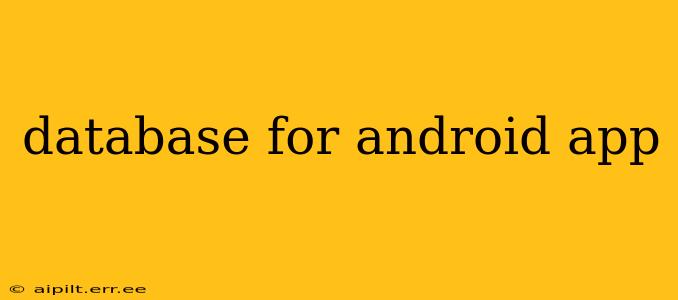Developing a robust Android application often necessitates the use of a database to store and manage data efficiently. The choice of database depends heavily on the app's specific needs, considering factors like data size, complexity, and performance requirements. This guide explores several popular options and helps you determine which best suits your Android app development.
What are the Different Types of Databases for Android Apps?
Several database options exist for Android, each with its strengths and weaknesses:
-
SQLite: This is the most common embedded database for Android apps. It's lightweight, serverless, and requires no separate server process. SQLite is well-suited for smaller applications with relatively simple data structures. Its ease of integration and local storage make it ideal for offline functionality.
-
Room Persistence Library (based on SQLite): Developed by Google, Room provides an abstraction layer over SQLite, simplifying database interactions and enhancing data access. It uses annotations to define database schema and offers features like data access objects (DAOs) to reduce boilerplate code. Room significantly streamlines database operations compared to raw SQLite.
-
Realm: A mobile-focused database, Realm offers a more object-oriented approach than SQLite. It provides a simpler API and improved performance for many operations. It handles data synchronization across devices more efficiently than other options. However, it’s a third-party library, requiring integration into your project.
-
Firebase Realtime Database: A cloud-based NoSQL database offered by Google's Firebase platform. It's exceptionally well-suited for real-time applications where data needs to be synchronized across multiple users instantly. Data is stored as JSON, and changes are automatically reflected on all connected clients. Firebase also offers features like data security rules and offline persistence.
Which Database is Right for My Android App?
The optimal choice depends on several critical aspects of your app:
H2: How much data will my app store?
For smaller apps with limited data, SQLite or Room is generally sufficient. If your app needs to handle significant amounts of data or complex data relationships, Realm or a cloud-based solution like Firebase might be better choices. Firebase scales more easily to accommodate very large datasets.
H2: What type of data will my app handle?
SQLite and Room excel with structured data that fits neatly into tables with rows and columns. Realm's object-oriented nature can be advantageous for more complex data structures. Firebase, being NoSQL, provides greater flexibility for semi-structured or unstructured data.
H2: Does my app require real-time synchronization?
If your app needs real-time updates across multiple devices or users, the Firebase Realtime Database is the clear winner. SQLite, Room, and Realm focus on local storage, offering no built-in real-time synchronization.
H2: How important is offline functionality?
SQLite, Room, and Realm offer excellent offline capabilities. Your app can continue to function even without an internet connection. Firebase provides offline persistence, but it relies on network connectivity to sync data eventually.
H2: What is my development experience?
SQLite requires a deeper understanding of SQL queries and database management. Room simplifies things by providing an object-oriented layer. Realm offers a simpler API than SQLite, but still requires learning its specific methods. Firebase offers straightforward integration, especially for developers already familiar with the Firebase platform.
Conclusion: Making the Right Database Decision
Choosing the right database significantly impacts the performance, scalability, and maintainability of your Android app. Carefully evaluate your app's requirements – data volume, complexity, real-time needs, offline functionality, and your development team's experience – to select the optimal database solution. Remember that while SQLite and Room are often excellent starting points for many apps, other options offer advantages for specific scenarios.
